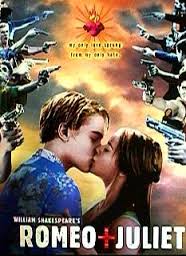
WILLIAM SHAKESPEARE’S ROMEO + JULIET
US, 1996, 105 minutes, Colour.
Leonardo Di Caprio, Claire Danes, Paul Sorvino, Diane Venora, Christina pickles, Brian Dennehy, Pete Postlethwaite, Miriam Margolyes, Harold Perrineau, Vondie Curtis Hall John Leguizamo, Jesse Bradford, M.Emmett Walsh.
Directed by Baz Luhrman.
Baz Luhrmann has a powerful imagination. Not only have he and his co-writer, Craig Pearce, updated the setting of Shakespeare's Romeo and Juliet to a Miami-style, Verona Beach (though filmed in Mexico), he has provided visuals that stun the eye and stimulate the mind. It needs to be seen more than once, but, after one viewing, I think most of it works very effectively. Much of the language and poetry seems quite topical and relates to corporations, gangs, fashion and a kitsch mediterranean Catholicism as well as love and death.
Leonardo Di Caprio is a credible Verona Beach Romeo, Claire Danes is an unglamorously persuasive Juliet. The Capulets (Paul Sorvino's mobster rage and Diane Venora's frivolous ambition) make more impression than the Montagues although the camp performance by Harold Perrineau as Mercutio is striking.
And the accents are American. But the entire cast is able to maintain the verse rhythms even in the most unlikely settings and situations that Luhrmann almost assaults us with.
A largely Australian production team have gone over the top in design, costumes and musical background. But, despite the op art style, this is a strongly intelligent interpretation of the play and of theatrical screen staging. Striking contemporary Shakespeare.
1. The many film versions of Shakespeare’s play? Ever-popular? The 20th-century, this version for the 1990s?
2. Baz Luhrman, his career, his pizzazz? The editing of the text?
3. The cast, Leonardo Di Caprio and Claire Danes at this stage of their careers? The character actors?
4. Verona Beach and the contemporary equivalents of locations, contemporary means of communication? The songs, the score? The television introduction and conclusion?
5. The characters and their performance, contemporary yet fitting with Shakespeare’s verse? The captions identifying each of the characters, as a Montague or a Capulet?
6. The production design, costumes and decor, make-up?
7. The familiar plot, the film’s screenplay fidelity to Shakespeare’s text?
8. Romeo, a Montague, pensive, young, pining for Roseline, Mercutio, his Queen Mab speech, his make-up, style, over the top, the Capulet party, Romeo going, the mask, seeing Juliet, not knowing who she was? the singer and performance? The lyrics for the meeting between the two? Looking through the fish tank? Romeo learning who Juliet was? Staying, coming back to the balcony, the balcony scene? The Montague gangs and types? Fighting, Romeo involved, killing? Going to see Friar Lawrence, talk, arranging the marriage, the wedding, the wedding night, Romeo and the death and his having to leave? The messages for him to return, Juliet’s death, his buying the poison, his killing himself, the tragedy?
9. Juliet, her father like a gang boss, her mother and her fussiness, the nurse and Juliet’s relying on her? Juliet, young, the prospect of marriage to Paris, her scenes with him? Going to the party, the dance? Falling in love, learning who Romeo was? Pining with the nurse? The nurse, the arrangements, the wedding, the wedding night, Romeo’s exile, taking the drugs, expecting to come to life again, seeing Romeo, her death?
10. The Capulets, their wealth, control of the city, their style? The mother’s concern for Juliet? The Montagues, more low key? The clashes between the families? The various types, the fights, the gangster styles, thugs, their sword guns?
11. Captain Prince, the police, the helicopters, calling the families to order and laying down the law?
12. The city itself, the visuals, the statue of Jesus, the Catholic iconography, even in the store where Romeo bought the poison?
13. The role of the media, information?
14. The ending, Shakespeare’s epilogue and the nature of the tragedy?